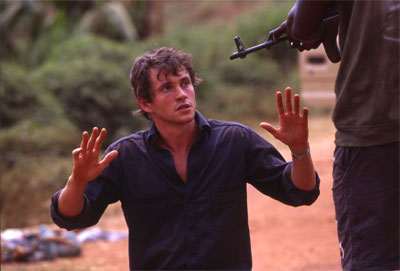
Veneration of all things Sigourney Weaver, probably my favourite American actress of the 1980s and 1990s, began on a first VHS viewing of
Alien, was cemented by a follow-up experience of
Aliens and then another and another, remained undiminished for every second of the criminally underrated
Ghostbusters II (OK, I was 12), and had me looking forward to
Alien³ as if Renée Maria Falconetti were returning to the role of Joan of Arc and intended to kick some serious ecclesiastical ass this time. Throughout that curious dirge of a sequel I found Weaver as riveting a presence as ever, so much more fearsome running down those prison corridors, somehow, than the alien itself, and so much more determined to claim the franchise as her own, to kill it off, even to resurrect it, six years later, on her own indomitable and fiery terms.
Alien³ is much more a Sigourney Weaver movie than it is a David Fincher movie or even an
Alien movie, in a odd way, and for all its gaping flaws — wilfully ignored amid the inconceivable excitement of getting to see it, underage, with my dad at an industry preview screening about which my younger brothers were not at all happy — the film still strikes me as an important statement in its genre, a statement that was Weaver's to make and that she made with a self-sacrificial pride every bit as ballsy as the character deserved. If this series was going down, she was going down with it, basically. She's lacked hits ever since, unless we count the delightful
Galaxy Quest (1999), in which she spoofed exactly the sort of role she'd refused to let Ellen Ripley ever become; I think she's extraordinary in
Alien: Resurrection (1997), meanwhile, even when the movie's gloopily assaulting her with all manner of unwelcome bolted-on conceits and geeky Joss Whedon-ness. But her reign as the dominant feminist icon in late 20th-century blockbuster cinema appeared to be over, and I for one am still in mourning.
In between, I consoled myself by getting to grips with the other Weavers: bowled over by her sinewy dramatic work in
Gorillas in the Mist, I forgave the movie every sin — it commits many — for allowing her to push Dian Fossey to the outer limits of audience sympathy and still make us feel the full, gutting force of tragedy at the end. Was this her, too, this smashingly strident comedienne Oscar-nominated in the same year for
Working Girl? And then the fierce, bony empathy of
Death and the Maiden, on which more below. Weaver's range as an actress has always impressed me enormously, and I think it's at least the equal of her
Map of the World co-star Julianne Moore's; Weaver couldn't pull off the tiny emotional calibrations of a
Safe, perhaps, but nor could I imagine Moore summoning the sheer fortitude, the regal poise, or the haughty, acidic outrage to do Weaver-like justice to any of the underlisted.
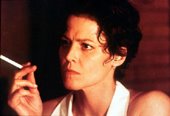 Five of the best:1. Death and the Maiden (1994)
Five of the best:1. Death and the Maiden (1994)More tightly-wound and combustible than ever, Weaver stomps all over Polanski's somewhat dour film of Ariel Dorfman's play, which got a minuscule theatrical release in Britain and is still maddeningly hard to track down. Her Paulina is the whole point: damaged, dangerous, and so ferociously
right that we bow our heads for doubting her sanity in the early going; that she can be this right and still this sadistic makes the second half all the queasier, and it's a performance that never for a second sentimentalises the unsightly psychological scars of victimhood or the savage, self-lacerating joy of revenge. Honestly, how an actress could have pulled out of the wreckage of
Alien³ with more galvanic force and determination to prove her "serious" mettle, I couldn't say, or how one of the weakest Best Actress fields in Oscar history failed to clear space for work this sensational.
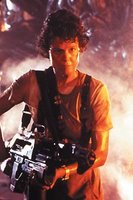 2. Aliens (1986)
2. Aliens (1986)Space was cleared here, on the other hand, in a "shock" genre nomination that was no shock to anyone who actually saw
Aliens, which Weaver owns like a single mother owns a loudly squalling child: far more primally, that's to say, than any of her co-nominees owned their own dainty little femme-pics. Try wresting this movie away from her, just try. Ellen Ripley was suddenly not just worth rooting for but worth dying for — a magnificent bitch, a ball-breaker, an LGBTA icon to arm up with flamethrowers and go to the grave with. That "A"s for alien, by the way, as the slimy buggers seemed hardly any less smitten — an entire species dying to procreate with this one woman. They can get in line, right?
 3. Gorillas in the Mist (1988)
3. Gorillas in the Mist (1988)Speaking of inter-species procreation, it gets worryingly intense in the forest glades of central Africa here, as Weaver's Fossey goes about forging a much more intimate bond with the apes than any of the token humans in her orbit, or Bryan Brown. It's the rare performance in a weak-ish biopic which is good enough on its own to make the movie worth going back to, again because of its obsessive, alienated quality, and because there's something unnervingly (poly)sexual in Fossey's very aloofness: check out the almost Darwinian contempt with which she dispatches her horny young assistants.
 4. Alien: Resurrection (1997)
4. Alien: Resurrection (1997)She's the saving grace here, of course, but way more than that: even as the movie's dissolving into gooey silliness, she gets big chances to take Ripley into fascinating new territory and plays them for all they're worth. Acid may be coursing through her veins, but I guess we always knew that; "I died", on the other hand, is a very Whedon punchline, but she delivers it with the kind of throwaway comic timing Sarah Michelle Gellar can only dream of. It's the scene in the cloning room (not the naff writhings of the finale) that really pushes the mythology forward a final notch, and golly if she doesn't make it genuinely potent and upsetting. All these half-formed Ripleys: what's left of her, even in this one? Weaver seemed to be asking the question.
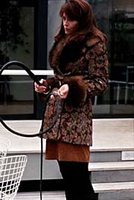 5. The Ice Storm (1997)
5. The Ice Storm (1997)All that overworked ice imagery and Joan Allen chipping away at the cube tray; but it's Weaver who wouldn't thaw under the Saharan sun here, and her Janey Carver is the movie's most resolutely hard and uncompromised creation, not to mention its best casting. She seems to steer miraculously clear of all the worst, most programmatic tendencies of James Schamus's screenplay; when I think of
The Ice Storm, which is not that often, to be honest, I think of Weaver twirling car keys, and then the rest of a vague, complacent, underachieved movie being whipped into shape by her every appearance.
And one of the worst:Imaginary Heroes (2004)Here, she's sucked, unavoidably, into utter smugness. Dan Harris's movie is such a stale, self-congratulatory slice of
Ordinary People-Lite picket-fence therapy drama that not even Weaver can burst through its grim lacquer. We'll move swiftly on from her truly embarrassing pot-smoking escapade in this, and hope for bigger and much better things around the corner. All hail Sigourney!
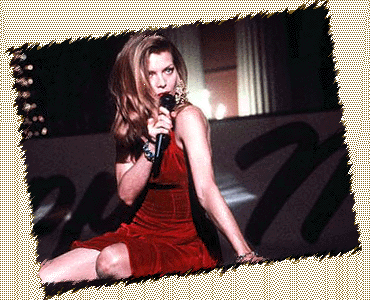
 Anyway, I jest. Nat is a Pfeiffer fan in the way that people are fans of eating, sleeping, breathing. And I like her too, very much. But there's one performance for me that towers over the Pfilmography and which I want to try and capture, just briefly. I can't imagine her ever topping her wonderful Susie Diamond in Steve Kloves's The Fabulous Baker Boys, and I don't know why she would ever need to, if the truth be told. The performance has just about everything: grace, ease, charm, wit, comic timing, magnificent allure, smoky singing, slinky moves on the piano and a totally assertive, screw-you independence. She should have won an Oscar for it. (Sorry, Jessica Tandy.)
Anyway, I jest. Nat is a Pfeiffer fan in the way that people are fans of eating, sleeping, breathing. And I like her too, very much. But there's one performance for me that towers over the Pfilmography and which I want to try and capture, just briefly. I can't imagine her ever topping her wonderful Susie Diamond in Steve Kloves's The Fabulous Baker Boys, and I don't know why she would ever need to, if the truth be told. The performance has just about everything: grace, ease, charm, wit, comic timing, magnificent allure, smoky singing, slinky moves on the piano and a totally assertive, screw-you independence. She should have won an Oscar for it. (Sorry, Jessica Tandy.) 












